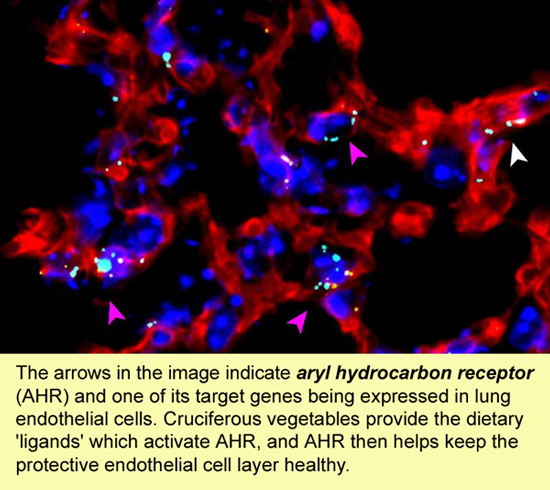By now everyone knows that mom had good reason to tell you, “Eat your veggies.” Vegetables contain just about every nutrient that growing kids—and adults—need for optimal health.
But now new research is showing that eating vegetables is even more important when you have a respiratory illness like the flu.
Researchers at the Francis Crick Institute in the UK discovered that molecules in certain vegetables help maintain a healthy barrier in the lung and, in turn, eases infection.
This particular benefit comes via the way vegetables promote a protein known as Aryl hydrocarbon receptor (AHR).
AHR is found at barrier protection sites within the gut and lungs. Naturally occurring molecules in the cruciferous veggie family are dietary “ligands” for AHR—meaning that they bind to it. So, once cruciferous vegetables are eaten, they activate AHR to target certain genes. Some of these genes can turn off the AHR system, enabling it to self-regulate.
The relationship between AHR and immune cells has been studied extensively, but this new study demonstrates that AHR is highly active in the endothelial cells that line blood vessels in the lung. Endothelial cells form the barrier between vessels and tissue and control the flow of substances and fluid into and out of a tissue.
Wikipedia notes, “These cells have unique functions that include fluid filtration, such as in the glomerulus of the kidney, blood vessel tone, hemostasis, neutrophil recruitment, and hormone trafficking.”
According to the researchers, the critical barrier between the body and external air is only made up of endothelial cell and epithelial cell layers because it has to allow oxygen to get in. At the same time, the barrier has to be able to prevent pollution, viruses, bacteria and other toxins from getting in.
Study details
To study the barrier, and how it is affected by AHR, the research team conducted a series of experiments on mice.
The researchers found that when the mice were infected with the flu, the blood in the airspaces of the lungs leaked across the barrier.
Further, when AHR was prevented from being expressed in the lung endothelial cells of infected mice, more blood and immune cells were seen in the air spaces, showing greater damage to the barrier.
The researchers also showed that flu infection causes a decrease in protective lung AHR activity, but only in mice fed AHR ligands in their diet before the illness.
These findings link food consumption to AHR activity and outcome in viral infection. Infected mice didn’t eat as much food when ill, so their intake of AHR ligands was reduced and the AHR system was less active, leading to more lung damage.
Like the mice used for the research, humans also don’t eat as much when sick. Moreover, when people are sick they tend to reach for easy-to-prepare convenience food… not the AHR-boosting vegetables that they need.
“People may be less likely to maintain a good diet when they’re ill, so aren’t taking in the molecules from vegetables which make this system work. It’s a good idea to eat lots of cruciferous vegetables anyway, but this shows it’s even more important to continue eating them when you’re ill,” says study author Jack Major, a former PhD student in the Wack lab and now a visiting scientist at Francis Crick Institute.
The study was published in the journal Nature in August 2023.
Future AHR research
Moving forward researchers also think AHR may be critical to other barrier organs, which will be the basis for continuing research. Some of this future work will include examining the relationship between AHR and gut health—and AHR and COVID-19.
“We looked at flu in this research, but other research has shown that COVID-19 may also reduce AHR activity in the lung. It will be interesting to investigate the impact of other respiratory viruses on AHR, and also whether different molecules in our diet use other pathways than AHR to affect lung function via endothelial cells,” the researchers wrote in the study summary.
According to Wikipedia, in addition to regulating immunity, AHR has roles in regulating metabolism enzymes, stem cell maintenance, and cellular differentiation.
So, while we may have recognized the benefits of “eating our veggies” for many generations, we still have a long way to go in fully understanding the intricacies of the biology behind those benefits.
– – –
Sources: Nature, Wikipedia-Aryl hydrocarbon receptor.



